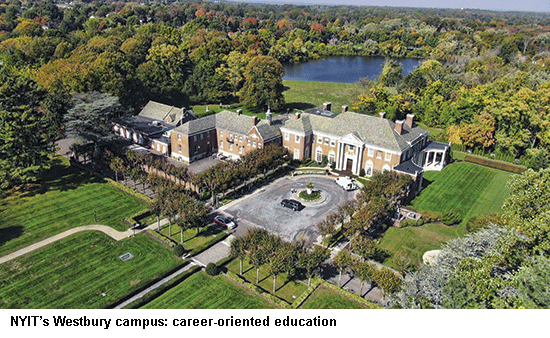NYIT enjoys an international reputation for offering career oriented programmes to over 10,000 students enrolled in its three campuses in New York and three overseas

Founded in 1955, the New York Institute of Technology (NYIT) enjoys a transnational reputation for providing career-oriented professional education to over 10,000 students enrolled in its three campuses in New York and three overseas (UAE, China and Canada). Accredited by the Middle States Commission on Higher Education and chartered by the Board of Regents of the State University of New York, NYIT offers undergraduate, graduate, and professional degree programmes in more than 50 academic disciplines, including architecture and design; arts and sciences; education; engineering and computing sciences; health professions; business management, and medicine.
The US News and World Report in its America’s Best Colleges Rankings 2017, ranks NYIT #32 among best regional universities (North). The institute’s school of engineering and computing sciences is ranked among America’s Top 70 computer science schools in The Financial Engineer Master of Computer Engineering Rankings 2018, while its business school is accredited by the Association to Advance Collegiate Schools of Business. Moreover, the institute ranks among the Top 25 percent of colleges based on salary potential of graduates as per the Payscale College Salary Report 2016-17.
New York City. NYIT’s main campus is in Manhattan — the heart of the Big Apple and the most densely populated borough of New York City (NYC, pop. 8.6 million). The cultural, financial, media and entertainment capital of the world, NYC hosts the world’s two largest stock exchanges — New York Stock Exchange and NASDAQ — and headquarters of several media and finance conglomerates. The Big Apple also boasts several globally famous landmarks — the Empire State and Chrysler buildings, Statue of Liberty, Brooklyn Bridge, and Ground Zero. Other popular attractions include the Staten Island Ferry, streets of SoHo (hosting fine art galleries and swish boutiques), Greenwich Village, Little Italy, Chinatown, Times Square, Central Park, Metropolitan Museum of Fine Art and the American Folk Art Museum.
The climate in NYC is continental with cold winters and warm summers. Temperatures fall to sub-zero in winter while summers are warm (14°C-26°C). June is the wettest month.
Campus facilities. NYIT has three campuses in NYC. While the Manhattan campus offers all major academic programmes, the institute’s largest campus is sited in Old Westbury on Long Island. The third campus is located in Central Islip, Long Island, where the institute’s Vocational Independence programmes are offered. Moreover, NYIT has established overseas campuses in China, the United Arab Emirates and Canada.
The Manhattan campus on the intersection of Broadway and 61st Street, hosts five state-of-the-art buildings with classrooms, labs, Architecture FabLab, stock trading floor, administrative offices, a 262-seat auditorium, fine arts facility, book store, metro café and study spaces. The institute’s Manhattan library in the Edward Guiliano Global Center provides access to 70,000 ebooks, 200 online databases and over 50,000 online journals.
In sharp contrast, NYIT’s Old Westbury campus sprawls over 176 wooded acres hosting heritage buildings. Campus landmarks include the David G. Salten auditorium, cafeteria, bookstore, lounge; Harry Schure Hall which houses the Enrollment Services Center, classrooms, academic and computing labs, and the Entrepreneurship and Technology Innovation Center.
Sports facilities on the Westbury campus include the Angelo Lorenzo Memorial Baseball Field, President’s Stadium (soccer and lacrosse), Recreation Hall (basketball), softball complex, six tennis courts, and a fitness centre. Moreover, there are over 20 students organisations, 15 honor societies and six fraternities and sororities across multiple interests, including science and technology, arts, entertainment, politics, architecture and design, education, healthcare, public service, business, and religion.
Admission. The minimum eligibility criteria for admission into NYIT’s undergraduate programmes is successful completion of secondary school (Plus Two), a good SAT score and proof of English language proficiency (6 in IELTS, 79 in TOEFL or 53 in Pearson Test of English). Admission applications should be submitted online (www.nyitapply.com or common application form) with a non-refundable application fee of $50, two letters of recommendation, transcripts of secondary school report cards, and a 300-word essay. Some study programmes mandate additional admission requirements. The deadline for admission into the spring semester beginning February 6 is December 1 and fall semester beginning September 2, is July 1.
For admission into postgraduate programmes, the requirements are completion of an undergraduate degree, acceptable GRE/GMAT scores and proof of English language proficiency. Moreover, every postgraduate programme has its own specific admission requirements. (https://www.nyit.edu/admissions/international).
For further information, contact the Office of Admissions, New York Institute of Technology, P.O. Box 8000, Old Westbury, NY 11568-8000; email: admissions@nyit.edu; website: www.nyit.edu
Accommodation. Housing options on the Manhattan campus include the Anderson Residence Hall (shared accommodation with students of Columbia University and Barnard College) and the Riverside Terrace Residence Hall. These residences offer furnished double and triple rooms, with a fitness center, self-service laundry, and cafeteria.
The Old Westbury campus offers rooms in halls of residence sited within minutes of the campus. All accommodation is suite-style and includes two single/double rooms, a shared bathroom and a common area.
Degree programmes. NYIT offers 90 undergrad and postgraduate programmes in over 50 faculties of study (see box).
| SCHOLASTIC OPTIONS AT NYIT |
|
NYIT’s five schools and two colleges offer a wide range of undergraduate and postgrad programmes. They include:
School of Architecture and Design. Architecture, architectural technology, interior design, urban and regional design
College of Arts and Sciences. Behavioural sciences, life sciences, communication arts, mathematics, physics, social sciences, English, digital arts and science
School of Engineering and Computing Sciences. Engineering and computing sciences
School of Health Professions. Clinical nutrition, health and wellness, health sciences, nursing, occupational therapy, physical therapy, physician assistant studies, health services administration
School of Inter-disciplinary Studies and Education. Teacher education, school leadership and technology, school counseling, inter disciplinary studies, instructional technology for educators, instructional technology for trainers
School of Management. Business management
College of Osteopathic Medicine. Osteopathic medicine, global health
Tuition fees (per year): $35,585
Living expenses: $14,310-$18,290 NB: US$=68
|
SRUTHY SUSAN ULLAS